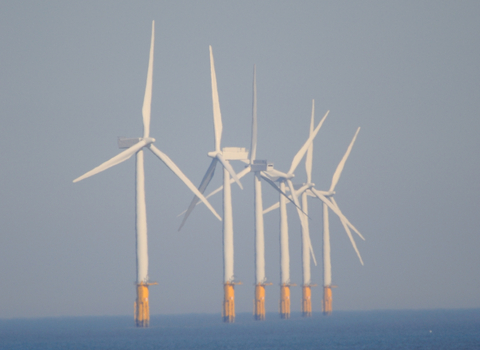Nationally Significant Infrastructure Projects (NSIPs) are large-scale projects relating to energy, transport, water, or waste. We keep a close eye on these projects and will challenge them if they pose a risk to wildlife.
Infrastructure projects that are considered nationally significant include: energy generation (nuclear power stations, windfarms, solar farms), major electricity lines, major roads and railway lines, waste and water (reservoirs, waste water treatment plants), and major pipelines.
As the name suggests, these projects are important for the whole UK and are thereore decided by the Government's Planning Inspectorate; unlike most development which is decided by local planning authorities (district councils).
Our position on current NSIPs in Suffolk
There are number of NSIPs currently proposed, consulted, or underway in Suffolk that we are monitoring for potential damage to nature:
Sizewell C
Sizewell C Nuclear Power Station is a new power station being built by EDF in Sizewell - near Leiston - on the Suffolk coast.
When Sizewell C was first proposed in 2008, we raised serious concerns about its potential to harm wildlife and protected habitats in the area. For many years, we campaigned alongside the RSPB and Suffolk Coast & Heaths National Landscape (then AONB), calling for the project to be relocated to avoid irreversible environmental damage.
Despite these concerns, in 2022 the Government confirmed that Sizewell C would go ahead, and early construction works began.
Since then, we have continued to hold Sizewell C to account - pushing for robust mitigation, compensation, and monitoring to protect Suffolk’s wildlife. We remain particularly concerned about rare and vulnerable species on the site, including natterjack toads, barbastelle bats, and adders, which have nationally important populations in the development area.

Norwich to Tilbury
Norwich to Tilbury (formerly East Anglia GREEN) is a proposal from National Grid for a 180km high-voltage power line linking substations in Norwich (Norfolk), Bramford (Suffolk),Tilbury (Essex), and new offshore wind farms.
The project was first proposed in 2021, with public consultations running through 2022 and 2023. National Grid submitted a Development Consent Order (DCO) to the Government in September 2024.
We have concerns about the project’s potential impact on wildlife - particularly marine species and habitats where offshore cables connect to land. We are awaiting further details before commenting on the specific risks to ecology and biodiversity.
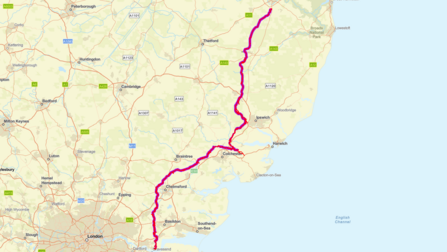
Sea Link
Sea Link is a proposed undersea electricity connection between Suffolk and Kent, being developed by National Grid. The project includes underground onshore cables, a new substation in Friston, and a converter station in Saxmundham.
The scheme was first proposed in 2022, with public consultations running from October 2022 to January 2025. National Grid submitted a Development Consent Order (DCO) to the Government in March 2025.
We are supporting the responses from Kent Wildlife Trust and the RSPB, both of which have protected wildlife sites that would be directly affected by the development.
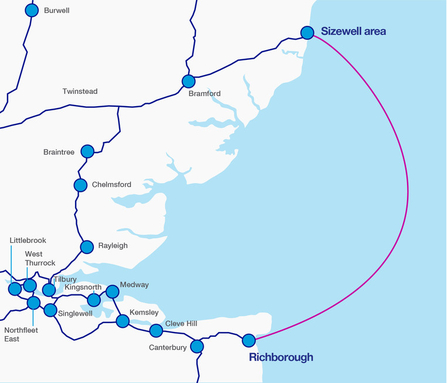
Lionlink
LionLink (formerly EuroLink) is a proposed electricity interconnector between the UK and the Netherlands, being developed by National Grid. Walberswick has been selected as the preferred landfall location, and underground cabling is planned to connect the new link to the UK power network.
We have serious concerns about the project’s potential impact on marine habitats in the North Sea, as well as the proposed cable route on land, which passes very close to several of our protected nature reserves.
We are monitoring the proposals closely and will register as an interested party when National Grid submits its Development Consent Order (DCO) to the Government, expected in summer 2026.
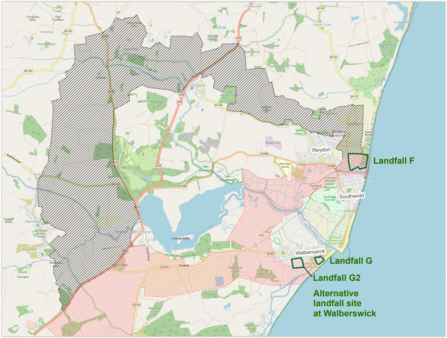
Solar farms
A solar farm is a large-scale installation of ground-mounted solar panels that generate electricity for the national grid. We're seeing a rise in solar farm proposals across Suffolk, including some large enough to be considered a NSIP. As with any development that could affect nature, we want solar farms to deliver the best possible outcomes for wildlife.
The UK and the world face both a climate and a nature emergency. We urgently need to transition to renewable energy to meet net zero targets - but this cannot come at the cost of wildlife.
We support the installation of solar panels on new and existing buildings (with care taken to avoid disturbing nesting birds or roosting bats). For ground-mounted solar arrays, we expect them to be located, designed, constructred, and operated in ways that protect wildlife and the environment. Many solar farms can actually create valuable habitat around the panels - generating clean energy and boosting nature recovery at the same time - and we advocate for this in Suffolk.
We recognise that solar farms can raise wider concerns beyond their impact on wildlife, but we are only able to respond to proposals where there is a risk to ecology and biodiversity.
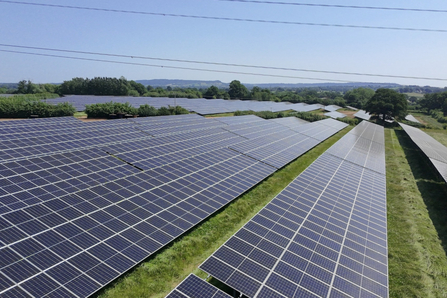
Latest news

Suffolk Wildlife Trust respond to Sizewell C establishing new environmental charity
Sizewell C, East Suffolk Council, and Suffolk County Council established a new environmental charity – East Suffolk Trust – which…
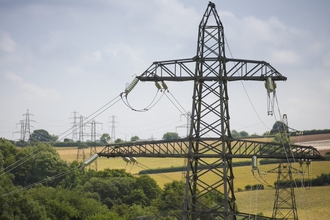
GB Energy: Why nature must be at the heart of new energy infrastructure
What impact could 'Great British Energy' have on our natural environment? How can the UK progress towards net zero without…
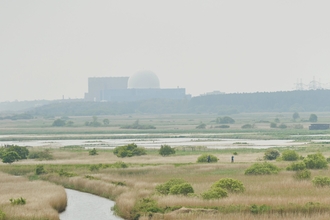
Suffolk Wildlife Trust and RSPB respond to new "environmental legacy" claims by Sizewell C
In a recent announcement, Sizewell C have said they 'want to create an environmental legacy in East Suffolk' and to 'help…
FAQs
How does Suffolk Wildlife Trust engage in NSIPs?
Normally developers will consult us about any NSIPs they are proposing which might affect the natural environment at the “pre-application” stage. Developers employ environmental consultants to assess the effects of their development on the environment. We will discuss with the developer and their consultant the scope which their environmental assessments need to cover, and we will work with them to ensure their assessments are comprehensive and accurate.
The scale of the likely impact on the natural environment will determine how much time we devote to each case. The greater the likely impact the proposal will have on statutory sites, County Wildlife Sites, our nature reserves, or key protected species the greater our involvement is likely to be.
We will also look for opportunities to enhance and recover nature, in line with our ’30 by 30’ ambition for 30% of Suffolk’s land and sea to be well-managed for nature by 2030. We always seek to achieve 20% biodiversity net gain for wildlife from all developments. We often work collaboratively with other conservation organisations such as Natural England, RSPB, and neighbouring Wildlife Trusts to achieve the best results for nature.
What impact can NSIPs have on nature?
We are in the middle of twin crises for biodiversity and climate - both globally and here in the UK - and the two are inextricably linked. Climate change is driving nature’s decline, and the loss of wildlife and wild places leaves us ill-equipped to reduce carbon emissions and adapt to changing weather patterns and extreme weather events. One cannot be solved without the other.
We know from experience that restoring nature can help soak up carbon emissions (known as natural solutions to climate change) whilst contributing many additional benefits. When healthy, our natural habitats can reduce the risk of flooding, help prevent coastal erosion, improve people’s health and wellbeing, maintain healthy soils, clean water, and support pollinators needed for our crops.
Nature itself is at risk from climate change, but if helped to recover, its potential to store carbon does mean it can help us to turn the tide on the climate catastrophe.
NSIPs - particularly for energy generation - are a vital part of the solution to the biodiversity and climate crises as they can help us reduce our reliance on fossil fuels for energy. In common with the rest of East Anglia, Suffolk has many energy-related NSIPs, because of the amount of offshore wind energy projects off our coast and a number of solar farms on land which take advantage of our relatively sunny climate.
How we can our energy infrastructure be more wildlife-friendly?
One of the most important ways of reducing harm to nature from new developments is a strategic approach; where the need, scale and location of multiple projects is planned in advance to enable them to go ahead in the right locations, using shared infrastructure and maximising their sustainable use of resources.
We are already engaging with many energy generation and related transmission projects such as Sizewell C (nuclear), Sunnica (solar), East Anglia Offshore (offshore wind), Bramford to Twinstead, Norwich to Tilbury, and Sea Link and LionLink (electricity transmission on land and at sea). Although we welcome projects in principle which contribute to mitigating the climate crisis by reducing fossil fuel use, we are always looking to ensure that they avoid impacts on nature through their scale and location.
Decisions taken by national government will not always put nature first, as it might be considered that there is over-riding public interest which leads to damaging projects going ahead. In such circumstances we will seek to ensure that any impacts on nature are taken into account and that realistic, deliverable compensation is put in place. For example by restoring or recreating habitats elsewhere. In addition, we will seek 20% biodiversity net gain from any project so that there is more nature being put into recovery than is being lost.
Brownfield vs greenfield sites
Whilst greenfield sites are pieces of land that haven't been built, brownfield sites are sites that have previously been built on however have since become abandoned or derelict.
Brownfield sites that have been previously developed are, understandably, frequently proposed as popular alternatives to undeveloped sites for new electricity infrastructure. While the use of brownfield sites can reduce ecological impacts it is also true that previously developed land can itself become very important for rare and protected wildlife. It is not the case that ecological impacts will always be less on brownfield land and site-specific assessments should inform comparisons of alternatives.
Don't we need more renewable energy infrastructure to fight the climate crisis?
The UK and the world face twin climate and ecological emergencies that will have huge social, environmental, and economic costs unless we take urgent action now.
We recognise the need for, and support, the transition to renewable energy to mitigate the worst impacts of climate change – including impacts on wildlife – and we understand the need to upgrade National Grid infrastructure to meet future needs, including getting electricity to where it is needed.
Making the transition from fossil fuels to zero and low carbon energy sources is vital but must not come at the expense of the natural environment that underpins our societies and economies.
New energy infrastructure to support the transition to a net-zero society must be planned, designed, and built with protecting nature and restoring biodiversity as essential requirements.
How can I engage with NSIPs?
You can comment on the proposal to the developer during the ‘pre-application’ stage and register as an ‘interested party’ with the developer to ensure you can participate in the process of examination by PINS.
At times, we might ask members to support our response to certain projects where we think that there will be disproportionate damage to nature; in those circumstances we will outline our case and encourage members to write in support of it.

